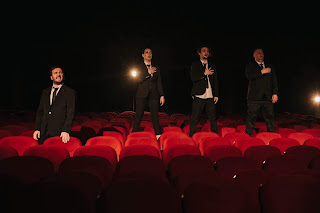A rough, red sea
A.Y.L.A.N, City Theater of Gjilan
The audience sit on the stage looking out a sea of empty seats. From this perspective they look like waves breaking on the shore. A rough red sea. Bodies flip flop across the seatbacks, storm tossed, both waving and drowning.
Jeton Neziraj’s text takes the form of a minimal series of numbered micro-scenes, Brecht on espresso. It’s a slim play and, as such, a director’s playground. Blerta Neziraj takes this challenge and she runs with it. From this frame, she has woven an incredibly vivid and inventive piece about the plight of refugees forced to make perilous life-threatening sea crossings in search of safety.
The play is ostensibly a comedy about Roccalumera, a Sicilian town where nothing of note ever happens. It’s starting to grind people down, the lack of action. Even the cat is depressed. A few refugees would at least liven things up, just like in Lampedusa. When they come across a body on the shore, they are ecstatic; even though, in all likelihood it is an Italian, they dress it up in a niqab.
Blerta Neziraj takes what sounds, when spelled out like this, like the most caustic of comedies, as the inspiration for a series of incredibly striking stage pictures. Together with choreographer Gjergj Prevaz, she turns the inverted world of the theatre into a space of play and of dreams. The actors, dressed in funereal black suits, clamber across the empty seats; they stride from row to row. The rows of crimson seats become rolling surf, waves under which a body can sink. The lighting design by Yann Perregaux completes the transporting effect. He phosphoresces the theatre, plunging it into flickering darkness, creating an indoor storm. He pulls us down towards the seabed.
The cast work well together, zipping themselves into body bags, forming a chorus.
Originally staged at the City Theater of Gjilan in 2019, the production was screened during the showcase due to the indisposition of one of the actors, but its power was not diminished. The way in which the space is used, actors and audience switched, this inversion of the normal way of things, is the perfect representation of a world in which people fleeing warzones, people desperate enough to try and cross turbulent waters in flimsy dinghy with their children in tow, are demonised, are recast as people to fear.
Though less than an hour long, the production executes several deft tonal pivots, from comedy to horror and back again; only in the end does it slow down and unveil the image of Aylan Kurdi, the three year old boy, face down in the sand, dead, an image that briefly appalled the world but quickly became absorbed into a world of images, one more picture at which to sigh and shake our heads. The last stretch of text is an act of re-humanisation, a poetic reminder that this was someone’s child, a boy who once played and smiled, a life not yet lived.
Natasha Tripney

Comments
Post a Comment